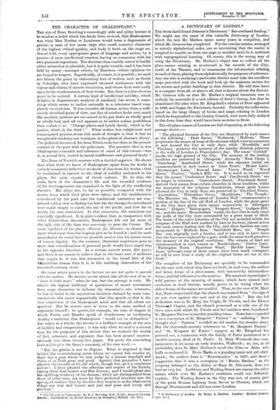THE CHARACTER OF SHAKESPEARE.•
TOE aim of Dean Beeching'e exceedingly able and pithy lecture is to combat a belief which has lately been revived, that Shakespeare was what Max Nordau or Lombroso would term a degenerate of genius—a man of low more type who could conceive character of the highest ethical quality, and body it forth on the stage en- dowed with every appropriate grace of language and action, by a process of mere intellectual creation having no connexion with his own personal experience. The doctrine thus crudely stated is hardly t Wier attractive or plausible, but it is quite tenable, and it has been held by many—amongst others, by Emerson—whose opinions we are bound to respect. Superficially, of course, it is possible ; we need not labour the point by elaborating lists of writers, such as Steele or Coleridge, who have expressed elevated sentiments with the vigour and charm of sincere conviction, and whose lives were sadly open to the condemnation of their works. But there is a less obvious point to be noticed. A certain kind of intellectual subtlety, which delights in dispassionate analysis of mankind, has about it some- thing which seems to incline naturally to a tolerance based com- pletely on cynicism. If you consider all human action from a suffi- ciently detached point of view, one line of conduct looks very much like another, motives are too mixed to be put down as wholly good or wholly bad, and all evil appears to be rather mason prohibitton than station is se. "Change places and handy dandy, which is the justice, which is the thief T " What strikes lees enlightened and emancipated persons about this mode of thought is that it has an inexplicable tendency not to remain in the sphere of abstract theory. The political divorce of Art from Ethics ends too often in the prosaic conflict of the poet with the policeman. The question then is, was Shakespeare's breadth and tolerance of mind of this nature—was it, in actual fact, rooted in moral indifference and personal laxity The Dean of Norwich answers with a decided negative. He shows that what little we know of Shakespeare apart from hie works is entirely consistent with what we know of him from his works—that ho conformed in essence to the ideal of nobility enshrined in his Flays, the ea\bt ed-yathlt of Creek culture. To do this, the main facts of the dramatist's life mid the recorded evidence of his contemporaries are examined in the light of the conflicting theories. His plays are, so far as possible, compared with the stories from which their plots were taken, and the modifications introduced by the poet into the traditional narratives are con- sidered with a view to finding out how far the changes he introduced were made simply to catch the ear of the public, and how far to satisfy his own conscience. In this connexion, the omissions are especially significant. It is quite evident that, in comparison with other Elizabethan dramatists, Shakespeare left out far more of the ugly side of life than was necessary to pass the Censor. The most repulsive of his plays—Measure. for Measure—is cleaner and more wholesome than the original plot as he found it ; and for such amendment he could have no possible motive but his innate sense of human dignity. On tire contrary, theatrical experience goes to show that considerations of personal profit would have urged him in the opposite direction. In a certain narrow sense, dirt pays ; and there is 110 reason to believe that to the baser sort of audience that enjoys it, it was less attractive in the broad filth of the Elizabethan drama than it is in the smirking obscenities of the twentieth-century revue.
On some minor points in the lecture we are not quite in accord with the author. He desires, u-o aro afraid, like all the rest of us, to "have it both ways" when he can, but the attempt is vain. He admits the logical inefficacy of quotations of moral sentiments from stage characters to indicate the dramatist's own interests ; he has nu belief in the mysterious intuition claimed by some corn ammeters, who assort dogmatically that this speech or that is the true expression of the Shakespeare mind and that all others are spurious. But he resorts once or twice to the same method of aucgument himself ; he quotes, for example, the tone of disgust in which Portia and Hamlet speak of drunkenness as confirming Audrey's tradition that Shakespeare "wound not be debauched." Bat taken as a whole, the lecture is a brilliant example of the arts of lucidity and compression ; it was only when we read it a second time for the purposes of this review that we realized the wealth set fact, reference, and argument that has been poured unosten- tatiously into these twenty-five pages. We quote the concluding lines which give the Dean's summary of his own work :—
" But his genius is not in dispute. What is disputed is that behind the overwhelming artist whom wo cannot, but wonder at, there was a man whom we may judge by a human standard and think of as torn great and good. Against that prejudice I have pleaded the records of his life which, though few, give a consistent picture ; I have pleaded the affection and respect of his friends, among them that honest soul Ben Janson; and I would plead also the uplifting tendency of his dramas, which are distinguished from these of other men, not more by their profound intuition into the springs of conduct than by the love they inspire in us for whatsoever linings are true and honest and just and pure and lovely and gracious."
• The rhorneter of Shakeepeare. By H. C. Berthing, D.D., D.Litt.. Dean of Yornich. London Pubhabed for the !WWII Academy by Humphrey Milford. its. net.]














































 Previous page
Previous page